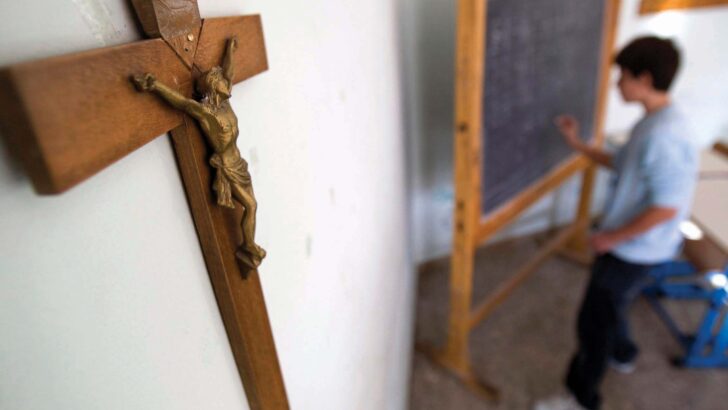Letter of the week
People of solid faith would not divest any school…
Dear Editor, The divesting of schools from Catholic management to other secular kinds of management is becoming a trend, so much so that I am wondering if we will have any schools under Catholic management in ten years’ time. I see this as making a joke of Daniel O’Connell’s great effort to win Catholic emancipation so that we could have our own Catholic schools. I also see it as one other symptom of the sell-out which I hold to be the principal hallmark of the Church in Ireland over the last four decades. People of solid faith would not divest any school as long as there is even one Catholic pupil of faith still attending that school or even one non-Catholic who might be searching for the faith. These are being betrayed.
Pope John Paul gave clear guidance on this in Catechesi Tradendae. He said that Catholic truth should not be imposed on anyone by any kind of compulsion but should be proposed in its entirety to all who will listen, not diluted from fear of “offending” anyone (which seems to be the number one crime today). If there are some parents who do not want their children to learn about the faith it is up to them and not the school authorities to make alternative arrangements. They are free to ask the Government for entirely secular schools if they so wish.
The root problem here is not so much the migrants but parents, teachers and school authorities who are lukewarm or cold in the faith, despite all their bragging about the Catholic ethos of our schools, that they still cannot see that the true faith is central to a rounded education for the simple reason that our pupils’ ultimate destiny is union with God.
Yours etc.,
Fr Richard O’Connor
Angelicum University, Rome
Zionism and ‘the promised land’
Dear Editor, David Quinn in his article, ‘Does anti-Semitism exist in Ireland?’ [The Irish Catholic – May 30, 2024] makes many interesting points, including the fact that Zionism is synonymous with Jewish nationalism; however, Zionism is not synonymous with nationalism in the broader sense for the following reasons.
Firstly, Zionism is predicated upon the whole notion of “the promised land”, this term having religious/Biblical origins, nationalism on the contrary makes no such claims.
Secondly, nationalism aspires to accommodate people of all faiths and none, while Zionism is on the contrary monolithic and the antithesis of any movement towards a pluralistic society.
Yours etc.,
Stephen Garland
Terenure, Dublin 6
A U.S. view on Irish Confirmation
Dear Editor, I commend Fr Bernard Cotter for his honesty in addressing the charade that present-day Confirmation has become (as well as First Communion and Baptism). His article [The Irish Catholic – June 6, 2024] speaks of a parish where none of 100 Confirmation candidates were present at Mass the following Sunday.
The article moves from the lesser issues of catechetical instruction and not appreciating the value of the sacraments to the primary issue: “In truth, the issue is something deeper – the dying of the faith.”
It is wishful thinking to hold that Confirmation without the requisite Christian belief is valid in the first place. The sacraments are the ways we commit ourselves to Jesus in the New Covenant; at the same time we receive the grace to fulfil these commitments. Taking the sacrament of matrimony as an example: if a given marriage is later found to lack adequate commitment / maturity when it was celebrated, a decree of sacramental nullity is issued (the marriage never actually happened in God’s eyes). Why should Confirmation be any different?
Here in the US there is more integrity in celebrating the sacrament of Confirmation. The candidates are at least 2 years older than in Ireland, the instruction is parish-based and taught by believing catechists and there is a greater expectation that the candidates and their families are committed.
But all that requires more work than the slapdash Irish approach…
Yours etc.
A.P. Breen
Bronx, New York


 (CNS photo/Tony Gentile, Reuters)
(CNS photo/Tony Gentile, Reuters) 